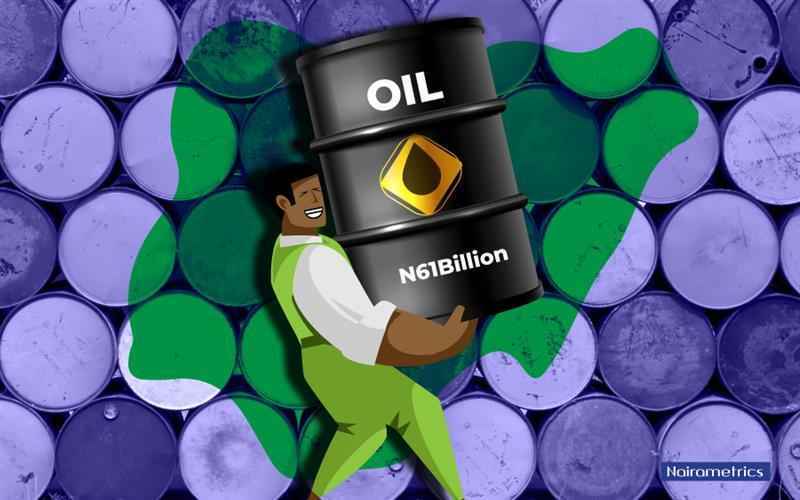
Despite the recent increase in oil prices, the Nigerian government is not profiting much from its crude sales, as the country continues to import processed petroleum at exorbitant costs due to the status of its domestic refineries.
Analysts and Nigerian policymakers have been reacting to the recent increase in oil prices with mixed emotions and apprehension.
Earlier in October, he gave a joint session of the National Assembly the budget projection for 2022.
Today, 7th October 2021, President Buhari presents the National Assembly with the draft Appropriation Bill for 2022.
The budget forecasts an N410.15 per dollar exchange rate, a 4.2 percent GDP growth rate, and a 13% inflation rate.
According to the president, total nationally distributable revenue in 2022 is expected to be N12.72 trillion, with total revenue available to support the 2022 budget predicted to be N10.13 trillion. This comprises N63.4 billion in grants and aid, as well as profits from 63 government-owned enterprises (GOEs).
Meanwhile, with a crude oil benchmark price of $57 per barrel and daily oil production estimates of 1.88 million barrels, the planned total expenditure for the year has been set at N16.39 trillion (inclusive of condensates of 300,000 to 400,000 barrels per day).
Normally, the rise in oil prices would aid the government in providing a fiscal year buffer. However, considering Nigeria's oil use, the difference may not be considerable.
Rally
Brent crude rose 0.86 percent to $80.22 a barrel on September 28, the highest gain since the fourth quarter of 2018. The global oil benchmark hit a three-year high as demand for the commodity grew around the world.
Shortly after a group of some of the world's most powerful oil producers decided against a large supply boost, crude prices soared to multi-year highs, causing analysts to predict a rally toward $100 per barrel.
The Organization of Petroleum Exporting Countries and non-OPEC partners, commonly known as OPEC+, said in the first week of October that it would keep to its existing accord for a gradual rise in oil output.
At the time, international benchmark Brent oil futures were trading at $81.74 a barrel, up more than 0.5 percent for the day, while the US West Texas Intermediate was trading at $77.92, up 0.4 percent.
OPEC+ had agreed earlier in July to increase output by 400,000 barrels per month until at least April 2022, presumably to phase down existing output cuts of 5.8 million barrels per day.
The price increase coincides with a resurgence in global oil consumption following the coronavirus pandemic, as well as growing prices for other energy sources. Both the US and India, another major oil consumer, have pressed OPEC to accept extra supply in order to keep prices stable.
According to Reuters, Bank of America Global Research analysts believe the bank could bring forward its $100 per barrel oil price prediction if winter temperatures are colder than expected. According to the bank, this likelihood might exacerbate a jump in demand and worsen a supply deficit.
The cost of natural gas has also increased. As the international economy reopens following the Covid-19 crisis' lockdowns, supply just cannot keep up with surging demand. Power plants and industry in regions of Europe and Asia are increasingly turning to crude oil as a relatively inexpensive source of electricity.
For Nigeria, high prices make no impact.
However, in response to last week's oil price rally, Nigeria's Finance Minister, Zainab Ahmed, stated that the country receives nothing from the increase in oil prices due to comparable increases in spending.
“The high price of oil means that we will be able to make more revenue,” she explained. "At $85 a barrel, we're much beyond the $40 per barrel we projected in our fiscal predictions for 2021."
“However, because we do not have operational refineries, we must purchase petroleum products for usage throughout the country. As a result, it reduces the profits we would have gotten otherwise," the minister told Bloomberg.
Nigeria is also experiencing a shortage in crude oil output, in addition to the problem of low oil sales earnings.
According to the Organization of Petroleum Exporting Countries, the country's production declined 6.68 percent in August, to 1.239 million barrels per day, down from 1.323 million in July (OPEC). Condensate, which Nigeria is not required to report to OPEC, is not included in the oil output statistic.
OPEC and its allies, led by Russia, had agreed earlier this month to increase global oil production in response to rising demand and the lifting of worldwide lockdowns.
Warri, Port Harcourt, and Kaduna are the locations of Nigeria's four functioning oil refineries. The plants, however, are in a condition of partial shutdown due to poor maintenance.
The Nigerian government is working with billionaire businessman Aliko Dangote to speed the building of his refinery in a Lagos suburb as part of measures to boost oil revenues. The Dangote Refinery project, which cost about $35.38 billion to build, spans 250,000 hectares and is projected to be completed by 2022.
The refinery is expected to generate gasoline and other petrochemical goods such as polyethylene and polypropylene once it is fully operational.
"By the time the Dangote Refinery starts up, it would be a big source of foreign exchange for Nigeria," he stated.
“
Currently, the purchase of petroleum products consumes close to 30% of the total cash we spend on imported things (by the time you add diesel, aviation fuel, petrol and the rest of that).
“The Dangote Refinery can generate 650,000 barrels of oil per day. A domestic component of around 455,000 barrels is included. Even if the 455,000 naira is all that is sold to Dangote, it will be a significant foreign save for Nigeria.
“
The cost of freight alone represents a significant savings for Nigeria. Because we would gain greatly from the Dangote Refinery if we had to travel to Europe or other areas of the world to bring in petroleum products, where we would pay a lot in freight and warehousing those things on the high sea before offloading them."
Mr. Emefiele went on to say that the initiative is part of Nigeria's backward integration strategy, and that the government is "extremely proud" of it.
